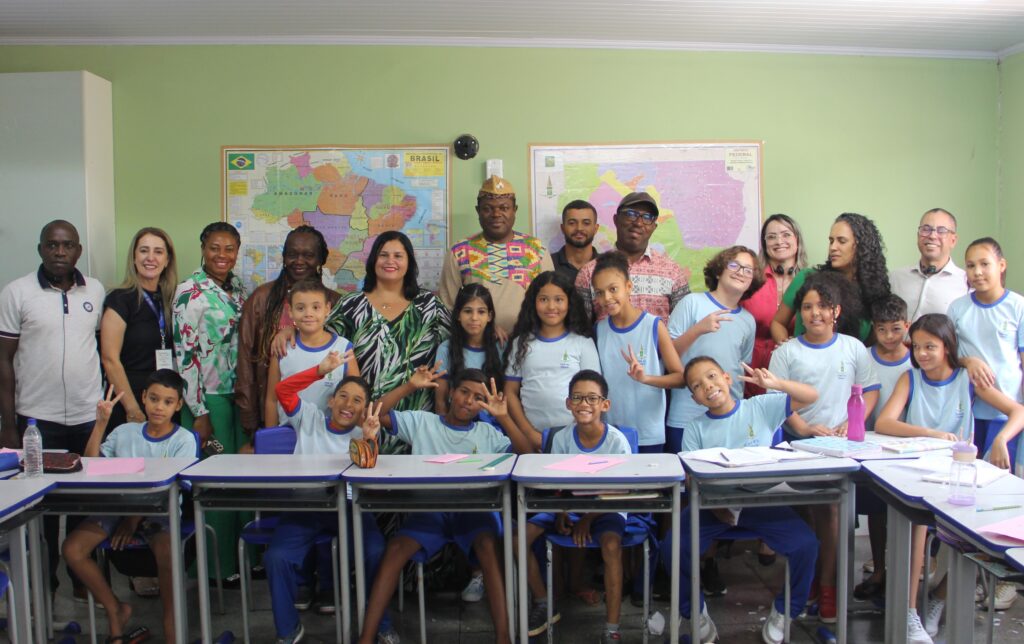 © WFP/Caroline Melo
© WFP/Caroline Melo
This week, between September 30 and October 4, a delegation of 11 people from the Republic of Cameroon came to Brasilia to learn more about the National School Feeding Program (PNAE). The main points on the agenda were understanding how school feeding works with local purchases and the federal government’s cistern program.
The visit focused on issues such as the PNAE’s funding mechanisms, the implementation of the programme and the models used in Brazil, nutritional aspects, management mechanisms and resource mobilization, as well as how the programme’s institutional and legal structures work.
For Oyono Adams Daniel, Secretary General of the Ministry of Basic Education of the Republic of Cameroon, the visit is a chance to learn from the Brazilian model. “The Brazilian government has one of the best results in the world when it comes to school feeding and that’s why the Cameroonian government sent us on this mission,” he said.
The schedule of technical visits gave the delegation the opportunity to meet government entities such as the National Education Development Fund (FNDE), the National Supply Company (CONAB), as well as participate in a meeting with representatives of the Cisterns program of the Ministry of Development and Social Assistance, Family and Fight against Hunger (MDS), with the presence of Minister Wellington Dias, to talk about water resource management and its relationship with food and nutritional security. In a presentation by the World Bank, the delegation was also shown the healthy saber tool for analyzing school feeding programs.
For the Director of the Center of Excellence against Hunger of WFP in Brazil, Daniel Balaban, South-South Cooperation is an essential tool for overcoming hunger and food insecurity in the world. “It is very important that we work together so that our countries can overcome this ghost of food and nutrition insecurity,” said Daniel during the opening of the mission.
The visit was organized by the Centre of Excellence against Hunger of WFP in Brazil, in partnership with the National Education Development Fund (FNDE) and the Brazilian Cooperation Agency (ABC).
Field visits
Throughout the mission, the delegation was able to make several field visits and get to know how everything works, from planting and buying local food to managing and providing school meals in schools.
The first visit was to the Associação dos Agricultores Familiares da Eco Comunidade do Assentamento 15 de Agosto (AFECA), where the delegation got to know the farm and the farmers and talked about aspects inherent in supplying organic and non-organic food to the PNAE. The delegation then got to know a family benefiting from the federal government’s Cisterns Program, in the Estrela da Lua settlement, in São Sebastião, in the Federal District.
They also visited two schools located in Gama: a rural school, CED Engenho das Lages, and an urban school, CED 08. At both schools, the delegation met with the school’s management, took part in the children’s snack time, visited the kitchens and food storage, and had the chance to ask questions about the implementation of school meals directly to the school’s technical staff.
WFP, school feeding and the Republic of Cameroon
Since 1973, Cameroon has received assistance from the World Food Program (WFP) in various areas, including school feeding, nutrition, health, social affairs, forestry and agriculture, as well as support for economic development plans and emergencies, such as the reception of refugees and aid for victims of droughts and floods.
Located in Central Africa, the country became independent in 1960 and serves more than 5 million elementary school pupils. 73% of these students are in public schools and 58.4% are in rural areas. In order to improve its school feeding program, the government intends to invest in approving a school feeding strategy document, implementing the program and drawing up a financing and advocacy plan.
According to the WFP Country Director in Cameroon, Gianluca Fererra, despite the country’s long history with its school feeding programme, it has always remained on a small scale. “The WFP has been building strong initiatives with the government to improve the programme, organizing a series of study visits to countries such as China and Egypt to learn about different school feeding experiences. However, this visit to Brazil is critical for us. Brazil has the largest school feeding program based on local purchases in the world,” he said.




